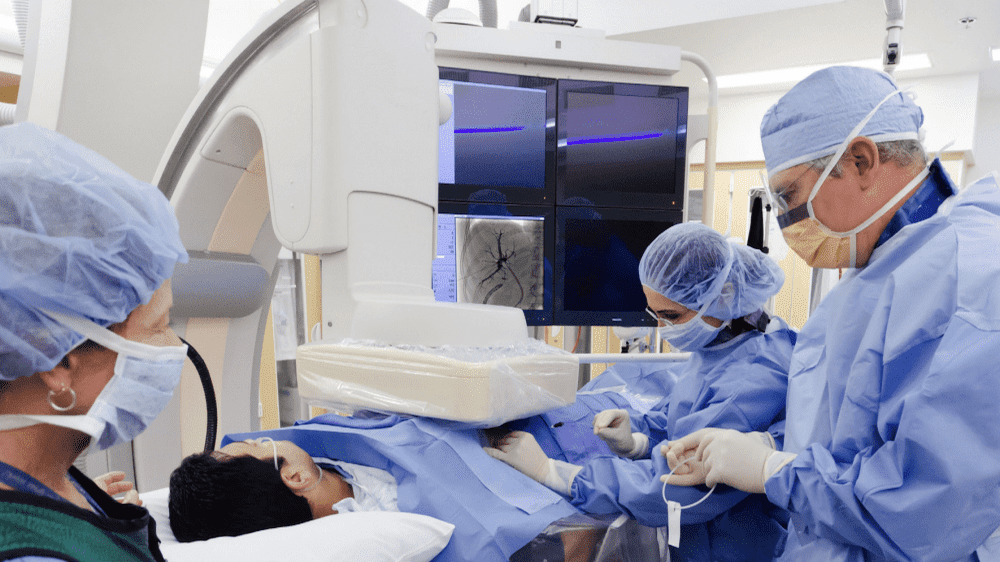When it comes to medical treatments, most people think of surgeries and medications. However, there is another type of treatment that is becoming increasingly popular – interventional radiology treatment. This minimally invasive procedure has revolutionized the medical field, offering patients a safer and faster way to treat a variety of conditions. This article will explore the benefits of interventional radiology treatment, the best interventional radiologist in India, and how this treatment is changing the face of modern medicine.
In the past three to four decades, IR specialists have moved out of the reading rooms and into the clinical setting, offering both consultation and technical know-how. With a wide range of minimally invasive therapeutic procedures, including fluid/abscess drainage, oncologic therapy, and vascular intervention, IR has moved from diagnosing to treating patients, and this has significantly reduced complications for both hospitalized patients and outpatients.
Interventional radiology treatment is a minimally invasive surgical procedure that uses imaging techniques such as X-rays, CT scans, and MRI to guide specialized tools and devices to the affected area of the body. This treatment is commonly used to treat a variety of conditions, including cancer, blockages in blood vessels, and infections. Unlike traditional surgeries, interventional radiology treatment does not require large incisions or long hospital stays. Instead, the patient can return home the same day or the next and recover much faster.
Various interventional radiology procedures performed by radiologists are listed below.Each intervention offers treatment for a variety of diseases one example is mentioned with some important interventions
Neuro-interventions
Neurointerventionalists use endovascular therapy to dissolve or remove the thrombus (clot) and re-establish blood flow to the affected areas of the brain. The interventionalist can remove the thrombus or provide medications to dissolve the thrombus using a catheter that is inserted via the blood arteries in the arm or leg and up to the brain.
GI and hepatobiliary procedures
An interventional radiologist will perform a transjugular intrahepatic portosystemic shunt (TIPS) to open a new blood flow path between the liver’s portal vein and hepatic inferior vena cava. The portal vein is a blood vessel that carries blood from the intestines to the liver. Hypertension (high blood pressure) can have a variety of harmful effects on the liver and small or large intestine at the portal vein.
Genitourinary procedures
Men may find it challenging to manage the frequency and/or urgency of their urination due to the prostate gland’s enlargement and compression of the nearby urethra.The “gold standard” of treatment for symptoms that persist despite medical optimization is transurethral resection of the prostate (TURP), while the medicine is often used as first-line therapy. However, TURP may not be the best operation for a specific population of patients since it can result in urine incontinence or irreversible male infertility.
Some other interventions are
Interventions in the central vascular system, Muscular-skeletal procedures, Interventions with peripheral blood vessels, and Interventions for the lungs.
The benefits of interventional radiology treatment are numerous. First and foremost, it is much safer than traditional surgery. Because interventional radiology treatment is less invasive, there is less risk of complications such as infection, bleeding, and damage to surrounding tissues. Additionally, interventional radiology treatment is much faster than traditional surgery. Patients can usually return to their daily activities within a few days, compared to weeks or even months for traditional surgery.
Interventional radiologists are medical professionals with specialization in, minimally invasive therapies and imaging diagnosis. By inserting different little tools, such as catheters or cables, from outside the body, they treat a variety of internal diseases. Interventional radiologists are actually radiologists who are additionally train in interventional procedures in addition to their diagnostic abilities.
This is because it requires thorough knowledge of imaging and pathology of various conditions, radiation physics (safety and hazards), and radiation equipment (most machines are the same as diagnostic radiology). Because of this, to perform IR operations safely and successfully for the patient the practitioner requires a solid foundation in general radiology. Most IRs in India are employe by the radiology division. However, a few centers are there in India and the majority of centers are overseas and have a well-established IR section. If a person is considering interventional radiology treatment, it is important to find the best interventional radiologist in India.
The top interventional radiologists have specialized training and experience in this field and can provide the highest level of care to their patients. One of the best interventional radiologists in India is Dr. Sanjay Gupta. With over 25 years of experience, Dr. Gupta is a pioneer in the field of interventional radiology and has performed thousands of successful procedures. He is know for his expertise in treating complex conditions, and his patients have praised him for his compassionate care. Some others are Dr.Basavaraj Biradar Consultant MBBS, MD, DNB, MNAMS, FRCR(UK), PDCC Interventional radiology (ILBSDelhi), EBIR ( European Board Certified ) and Dr. Nishant Aditya Consultant MD (Radiodiagnosis), Fellow in Interventional Neuroradiology, Speciality Interventional Radiology, Hospital Mumbai – SRCC Children’s Hospital.
Interventional radiology treatment is changing the face of modern medicine. With its numerous benefits and minimal invasiveness, it is quickly becoming the preferred treatment option for many conditions. From cancer to blood vessel blockages, interventional radiology treatment offers patients a safer, faster, and more effective way to treat their conditions. And with top interventional radiologists like Dr. Sanjay Gupta in India, patients can rest assured that they are receiving the highest level of care.
In conclusion, interventional radiology treatment is a game-changer in the medical field. Although much of its potential is steel left unfold one thing can be conclude it offers numerous benefits. Including increased safety, faster recovery times, and less invasiveness, and holds much more benefits than surgery. And with top interventional radiologists like Dr. Sanjay Gupta in India, patients can be sure that they are receiving the highest level of care. If a person is considering interventional radiology treatment, should never hesitate to discuss this option with a healthcare provider. It could be the key to faster healing and better health.






















